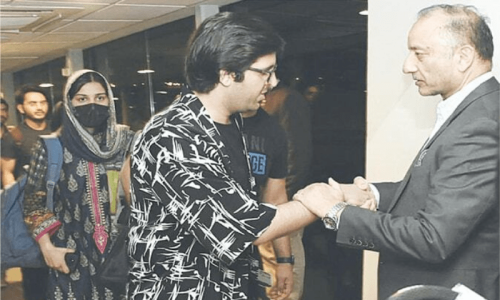UNITED NATIONS, Nov 14: A high-level meeting of the United Nations General Assembly has rejected the use of religion to justify the killing of innocent people and terrorist acts and voiced concern that serious instances of intolerance, discrimination and harassment persist between people of different faiths and cultures.
In a consensus declaration read out by the UN Secretary General, Ban
Ki-moon, at the conclusion of the two-day “Culture of Peace” gathering here on Thursday, participants called for mutual understanding through dialogue, and respect for human rights among proponents of various faiths, cultures and civilisations. The special session was convened at the initiative of King Abdullah of Saudi Arabia.
“Concerned about serious instances of intolerance, discrimination, hatred expressions, and harassment of minority religious communities of all faiths, participating states underlined the importance of promoting dialogue, understanding and tolerance among human beings, as well as respect for all their diverse religions, cultures and beliefs,” the declaration said.
“Participating states affirmed their rejection of the use of religion to justify the killing of innocent people and actions of terrorism, violence and coercion, which directly contradict the commitment of all religions to peace, justice and equality,” it added. Mr Ban said the challenge now was to move beyond “powerful, positive words” to “dialogue that delivers”. Heads of state, ambassadors and senior officials from some 70 countries addressed the meeting, including Saudi King Abdullah, US President George Bush, Pakistan President Asif Ali Zardari, British Prime Minister Gordon Brown, Israeli President Shimon Peres, Afghan President Hamid Karzai and Jordan’s King Abdullah.
In the declaration, the General Assembly reiterated its call for “promoting a culture of tolerance and mutual understanding through dialogue, and supporting the initiatives of religious leaders, civil society, and states seeking to entrench the culture of peace, understanding, tolerance, and respect for human rights among the proponents of various faiths, cultures, and civilisations”.
The participating states expressed their commitment to strengthening existing mechanisms within the United Nations for “promoting tolerance and human rights, preserving the institution of the family, protecting the environment, spreading education, eradicating poverty, and fighting drug abuse, crime and terrorism, noting the positive role of religions, beliefs and moral humanitarian principles in tackling these challenges”.
Mr Ban voiced deep gratitude to the Saudi leader. “King Abdullah’s initiative has come at a time when the need for dialogue among religions, cultures and civilisations has never been greater. It has brought together people who might not otherwise have a chance to interact. Along with other initiatives, it will contribute to building a more harmonious world. “The challenge now is to go beyond the powerful, positive words we have heard these past two days. I pledge my full support to this effort. It may take time to see results, but I am convinced that this meeting was an important step forward.”
On Wednesday, at the opening session, General Assembly President Miguel D’Escoto told participants that the world was facing its most difficult period since the founding of the UN.
He urged global leaders to use their “moral strength” to find solutions to some of the greatest problems plaguing the planet, including poverty, hunger and climate change.













































Dear visitor, the comments section is undergoing an overhaul and will return soon.